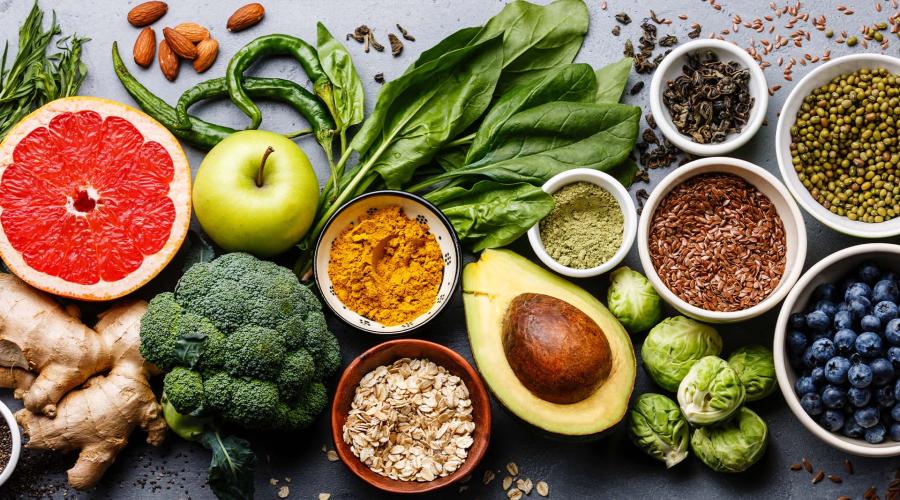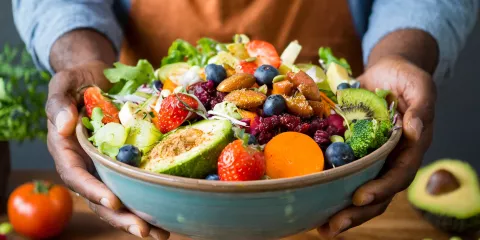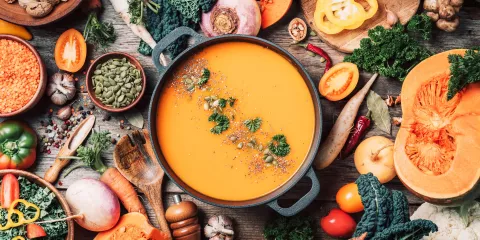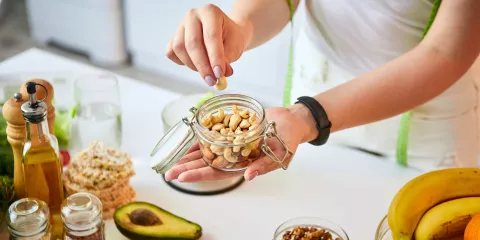
12 Months of Healthy Eating: Antioxidant Boost
Meal Plan Created By: Amanda Kostro Miller
Eating healthy is a journey, one that often involves trying out new foods. In fact, research shows most healthy people benefit from incorporating new foods into their diet.1,2 That’s why here at Kaneka, we want to help you decide what to try out in the kitchen—with 12 months of healthy eating! Every month, we’re sharing a custom-built meal plan from a registered dietician with a specific focus. Did you know that many Americans avoid cooking at home because they think it takes too long?.3,4,5 That’s why we’ll also discuss ways to make cooking at home easier, more fun, and less time-consuming. Ready to start eating healthy? It’s a fun way to get started on building your overall heart health, and with the delicious and creative meal plan for this month, you’re not the only one who will feel the excitement. Your taste buds will, too.
ICYMI: 12 Months of Healthy Eating: One-Pot Meals
When we think about our health, we’re often concerned with frightening prospects like having a heart attack, finding out we have cancer, or something otherwise scary and life-changing. You have likely heard of antioxidants before—that they neutralize free radicals which can damage cells, and that they help reduce inflammation and the risk of certain diseases, such as cancer, and that on the whole, they’re very good for you. In fact, most people already correlate antioxidants with “eating healthy,” but do you know why antioxidants are good for you? This month, we’re focusing on all the ways you can give your diet an antioxidant boost—and why you’d benefit from incorporating antioxidants into your healthy meal planning. Luckily, foods with naturally occurring antioxidants tend to be quite delicious and nutritious—take a look at our 7-day antioxidant boost meal plan and see for yourself!
Download The Printable Meal Plan
What Exactly Are Antioxidants?
Do Antioxidants Really Work?
Simply put, antioxidants are any chemical compound which can help fight the effects of naturally occurring unstable molecules in your body called “free radicals.”6 Free radicals lack their own electrons, so they have to steal electrons from other, fully-functional molecules in our body, a process which can wreak havoc on our cells. If left unchecked, free radicals can multiply, and all this electron-stealing can cause significant damage to your cells, even affecting your DNA itself in some cases.7 Antioxidants help counter these effects and limit the damage caused by free radicals. In this way, antioxidants can be said to detox your body, by promoting your health on a cellular level. Studies have shown that individuals who eat more antioxidant-rich fruits, legumes, and vegetables tend to have a lower risk of developing chronic stress-related ailments like cardio-vascular diseases and cancer.8
This is why antioxidants found in fruits and vegetables have a powerful reputation as cancer-fighting nutrients. Now that you know what antioxidants do for your body, how do you know where to find them in your grocery store’s produce aisle?
Which Foods Contain Antioxidants?
Antioxidants occur in the form of commonly found nutrients, especially vitamins C and E, and plant compounds called “flavonoids”, naturally occurring in a variety of foods. For this reason, most food groups which are high in these vitamins are good sources of antioxidants. Try incorporating colorful fruits and veggies like broccoli, sweet potatoes, beets, brussels sprouts, cantaloupe, pomegranates, or kale for starters. Legumes and nuts like chickpeas, almonds, lentils, or cashews are also great ways to add antioxidants to your diet.9 Medical research has shown that green tea, coffee, dark chocolate, and berries contain high levels of antioxidants.10 What’s more, the specific antioxidants found in certain foods, like mushrooms, can help reduce mild cognitive impairment and support neurological health.11 Antioxidants can even be found in some fish (like salmon) and meat, albeit in smaller measures.
How Can Antioxidants Power Up Your Diet?
Antioxidants consumed from healthy, whole food sources play a significant role in promoting the body’s health. Adding antioxidants to your diet has plenty of benefits outside of just protecting you from the damage caused by free radicals. Studies show that some antioxidants play a role in helping firm up your skin and keep you looking youthful, particularly when you cut out the unhealthy, processed foods.12 Research suggests that the antioxidants found in vitamins C and E can help reduce age-related macular degeneration and cataracts, meaning that an antioxidant rich diet can help your eyes function better for longer.13 Best of all, scientists are continuing to study antioxidants and their positive effects on human health. Adding antioxidant-rich foods to your diet and limiting your intake of saturated fats, cholesterol and sodium, is a flavorful and easy way to increase your heart health overall.
Did You Know that Ubiquinol is an Antioxidant?
Because Ubiquinol is a specifically optimized type of CoQ10 which includes extra electrons, it also functions as a powerful antioxidant in itself. Because Ubiquinol comes equipped with these spare electrons, it can act as a neutralizing force against free radicals by providing its own electrons to free radicals to protect your cells from damage.
Ubiquinol is also one of the few antioxidants that works within the mitochondria (the powerhouse of energy within our cells, and therefore the major source of most of our free radicals) as well as within our cell membranes and LDL cholesterol.
Because Ubiquinol is the antioxidant form of CoQ10 that fights against free radicals inside the mitochondria,14 taking Ubiquinol on top of eating an antioxidant-rich diet is a great way to ensure that free radicals are kept in check to support your body’s health at the cellular level.
Related: Are You Taking the Right Form of CoQ10?
Healthy Recipes for Meals That Provide An Antioxidant Boost

Now that you know how antioxidants can benefit you, let’s get cooking! Plenty of heart-healthy recipes already incorporate antioxidants, but any of the meals on our week-long Antioxidant Boost meal plan will do the trick. The plan was developed by a Registered Dietician and is filled with delicious breakfasts, lunches, dinners, and snacks that are rich in antioxidants (and in flavor). Try boosting your morning with a mouth-watering avocado breakfast sandwich, grab a quick and easy snack with the pear and brie sliders (but go light on the cheese), or treat yourself to the bright and springy flavors of the shrimp pesto pasta. With so many fresh and tasty ways to add antioxidants to your diet, who wouldn’t want to give this meal plan a try?
For more heart-healthy meal options, download our heart-healthy cookbook. It’ll give you twelve additional healthy dinners that are as tasty as they are simple.












